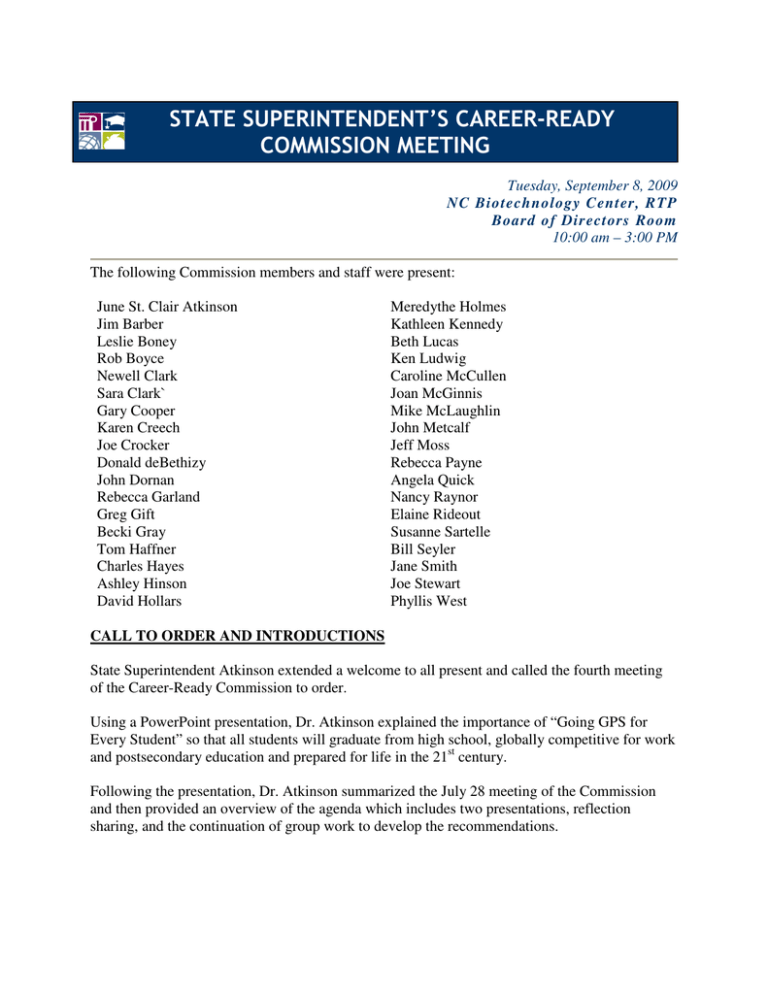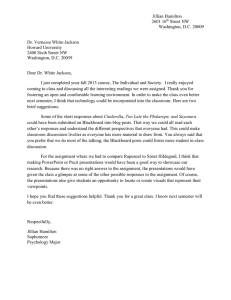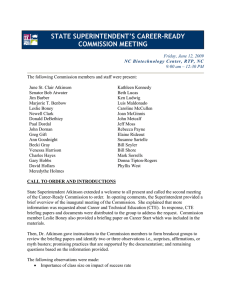STATE SUPERINTENDENT’S CAREER-READY COMMISSION MEETING
advertisement

STATE SUPERINTENDENT’S CAREER-READY COMMISSION MEETING Tuesday, September 8, 2009 NC Biotechnology Center, RTP Board of Directors Room 10:00 am – 3:00 PM The following Commission members and staff were present: June St. Clair Atkinson Jim Barber Leslie Boney Rob Boyce Newell Clark Sara Clark` Gary Cooper Karen Creech Joe Crocker Donald deBethizy John Dornan Rebecca Garland Greg Gift Becki Gray Tom Haffner Charles Hayes Ashley Hinson David Hollars Meredythe Holmes Kathleen Kennedy Beth Lucas Ken Ludwig Caroline McCullen Joan McGinnis Mike McLaughlin John Metcalf Jeff Moss Rebecca Payne Angela Quick Nancy Raynor Elaine Rideout Susanne Sartelle Bill Seyler Jane Smith Joe Stewart Phyllis West CALL TO ORDER AND INTRODUCTIONS State Superintendent Atkinson extended a welcome to all present and called the fourth meeting of the Career-Ready Commission to order. Using a PowerPoint presentation, Dr. Atkinson explained the importance of “Going GPS for Every Student” so that all students will graduate from high school, globally competitive for work and postsecondary education and prepared for life in the 21st century. Following the presentation, Dr. Atkinson summarized the July 28 meeting of the Commission and then provided an overview of the agenda which includes two presentations, reflection sharing, and the continuation of group work to develop the recommendations. NC Biotechnology Center Tuesday, September 8, 2009 RTP, NC PRESENTATIONS Economic Development in North Carolina Secretary of Commerce Keith Crisco spoke briefly about the Department of Commerce’s role as the state’s leading economic-development agency, working with local, regional, national and international companies. He explained that the department’s mission is to improve the economic well-being and quality of life for all North Carolinians. Secretary Crisco noted that the mission is carried out by serving existing business and industry, including providing international trade assistance; recruiting new jobs and domestic and foreign investment; encouraging entrepreneurship and innovation; marketing North Carolina and its brand; supporting workforce development; strengthening communities; and promoting tourism, film and sports development. Secretary Crisco introduced Chris Harder, Director of Economic Analysis, Policy Research and Strategic Planning Division, who provided a brief overview of North Carolina’s economy and its challenges due to the current recession as well as the purpose behind targeting industries and clusters. In conclusion, Mr. Harder noted that clusters utilize information on existing companies and industries, and the relationships between them, to determine industry strengths, weaknesses, opportunities and threats, and well developed clusters increase company and industry competitiveness. High Schools That Work Dr. Gene Bottoms, Senior Vice President, Southern Region Education Board, directed Commission members to a copy of SREB’s 2009 draft report “A Blueprint for Improving High School Achievement and Graduation Rates in SREB States.” Dr. Bottoms noted that the report outlines ten important steps toward developing the next generation of school accountability, and setting stronger goals for graduation and achievement. The report also addresses the need to expand the definition of rigor to include career-related, social, cognitive and academic skills essential to students’ future success. Reflection on Presentations At the request of Dr. Atkinson, Commission members shared their reflections about the presentations above. Dr. Atkinson briefly summarized the purpose of having all of the previous presentations and the importance of expanding the Commission’s knowledge base in order to make coherent and farreaching recommendations to improve public and career-technical education in the future. DEVELOPMENT OF RECOMMENDATIONS At this time, Dr. Atkinson explained that staff members Greg Gift and Sara Clark synthesized information from the Commission members’ comments, Blackboard discussions, initial recommendations, and presentations to formulate policy recommendations and supporting strategies. The draft begins on page 45 of the materials. Dr. Atkinson provided instructions and divided the members into smaller work groups to consider, add, and revise the draft policy statements and supporting strategies. 2 NC Biotechnology Center Tuesday, September 8, 2009 RTP, NC Following the group work, Greg Gift guided the members through this segment of the agenda. Group 1 o Concern - not explicit about higher education’s role in the process and needs more clarity o A lot of recommendations and it appears to be a document of what is possible o Need to push policies forward and should take the SREB recommendations under consideration o Policy was not infrastructure, but of will o A lot of educators do not understand the needs of business since they have not worked in business; helping educators understand business needs would be beneficial o How we get better partnerships with business needs to be a high priority o Businesses are willing, but educators do not always know how to use their talents o Need to impose a set of disciplines to outline around rationale, cost and physical need, timeline. Who is accountable? o Need to have document that states the consequences if the policies are not implemented o Need to be careful that we don’t signify that there is one single bullet that will give us the academic solution o Need to recognize that a dedicated high school is not the only solution, but part of a solution o Too narrow under Creating entrepreneurs; entrepreneurship can cover many aspects teachers and students carrying out work beyond high school o ISO 9000 – should be part of a platform and look at how it can be used to teach workplace skills Group 2 o Under creating, not realistic that we can graduate an 18 year-old entrepreneur ready o The word innovation is very important in the first recommendation – look at intellectual entrepreneurialism; encourage creativity o Wording might be too vague, too broad, needs to be refocused o Requiring all high school teachers to have an Internship needs to be changed – challenges of logistics, i.e., the pay and the timeline needs to be thought through; mission is for teachers to gain knowledge in the business world and transfer that knowledge to the classroom; CEU credit important o Tell the secrets of successful CTE – needs to be reworded – needs to be about marketing and look at rebranding CTE o Recommendations Connecting – revamp traditional time structures; face-to-face and virtual; look at summer school (rebranding – not just for dummies) – used for acceleration o Importance of a blended model of learning; students learn at different speeds o Rebranding – requiring redesign of any high schools that are not meeting the graduation rate has to be transformed into a CTE focused school - that may create negative connotation o Establish regional career clusters – great idea as written 3 NC Biotechnology Center Tuesday, September 8, 2009 RTP, NC o Recommendations on customizing for every student a comprehensive career plan are already in place but not enough guidance counselors; look at a two-year plan and is it possible to require students to declare a career this early o Counselors in middle schools being key to help make these recommendations happen o Provide professional development for teachers – not just for existing teachers, but critical aspect of teacher preparation for future teachers o Require all LEAs to have Business Advisory committees – allow to be regional if a school system is too small and have other stakeholders involved that may not be involved in a business community o Under Collaborating – education and business need to talk to each other on every level o Underperforming schools able to recraft themselves. Let schools decide the margin for graduation rate Group 3 o Trying to determine the what – being nimble, agile, and flexible - businesses do this well, but education needs to be more this way o Grade level classification done away; have a certain number of hours to complete o Acquire credits to become more flexible o Changing organizationally and funding needs to be done differently; block grants – decide locally o Career clusters foundation and change at looking at what works and how to reach students o Change delivery systems for 21st century classrooms; NC Learning Technology Initiative now in pilot o Required internship – allow it to be CEU requirement and have counselors and school administrators involvement in internships o Look at CTE and need for rebranding; marketing o Local business advisory committee - need regional superintendents on committee Group 4 o Entrepreneurial - start with teaching community and have universities work on teacher preparation (what universities bring to the table) o Planning – having more counselors per student when looking from the planning perspective; issue needs to be addressed o Career Planning – opportunity to engage students; losing 9th graders because of rules and regulations; need more flexibility to take more CTE courses to get them more engaged Additional Recommendations o The organization is good – looking at business engagement; value added in recommendations added before in terms of recommendations – cabinet - council initiated by Gov. Hunt o Would have liked to have seen the draft ahead of time; would like to see the second draft on Blackboard for feedback 4 NC Biotechnology Center Tuesday, September 8, 2009 RTP, NC o Would like to see the agenda organized to have work time at the beginning and presenter at the end of the meeting o Recommended another face-to-face meeting o Need to have a goal to agree on a document o Question about how the recommendations – three Cs evolved from all of the work o Recommend hearing from the Jobs Commission to hear what they are planning to do with what we generate o Need to listen to our customers – wonder what some of our drop outs would say; recommend taking element of report and doing a focus group or is there a group that has done this; SREB commissioned a group to look at this o Linked to the new schools project o DPI meets with students and asks what they think about the programs in their schools o Leslie Boney - NC Tomorrow video – link from Blackboard to watch video NEXT MEETING An email communiqué will be sent to Commission members announcing the latest draft on the Blackboard. NEXT MEETING: 5 October 29, 2009




